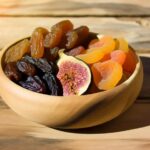You might not be aware that the history of canned fruits dates back to the early 19th century, a time when preserving food was as much an art as it was a necessity. As you reach for that tin of peaches or pears, consider the journey canned fruits have undergone, evolving from a rudimentary preservation method to a staple in kitchens worldwide. Del Monte, among other brands, has perfected this process, offering a variety of non-GMO, preservative-free options that maintain a delightful taste and texture, mirroring their fresh counterparts. While the convenience and year-round availability of canned fruits are apparent, the nutritional benefits they retain might surprise you. Moreover, understanding the ethical and environmental implications of your choices can influence not just your diet but the planet’s health. As we explore the nuances of canned fruits, from their rich history and nutritional value to the art of selection and creative serving ideas, you’ll discover there’s more to these pantry essentials than meets the eye.
Key Takeaways
- Canned fruits have a long history and played a vital role in food preservation and nutrition, especially during World War II.
- Canned fruits offer nutritional benefits, being non-GMO, preservative-free, and packed with essential nutrients.
- When comparing fresh and canned fruits, canned fruits provide convenience, consistent quality, and a longer shelf life.
- Popular varieties of canned fruits, like those offered by Del Monte, include peaches, pears, pineapples, and cherries, which are sun-sweetened and non-GMO.
History of Canned Fruits
Canned fruits’ journey began in the late 18th century, when France’s quest for food preservation led to a revolutionary method that would feed armies and navies across the globe. In a bid to sustain their forces, the French government offered a cash prize to anyone who could invent a reliable preservation technique. This challenge was the seed from which the rich history of canned fruits sprouted, providing not just a solution for the military but also shaping the future of food consumption worldwide.
By 1812, this innovative method crossed the Atlantic, where Robert Ayars opened the first commercial canning establishment in New York City. As the years progressed, the 1840s saw an explosion of canning companies across the United States, marking the beginning of canned fruits as a staple in American pantries. The process they perfected, managing the delicate balance of heat and time, ensured that the fruit retained its flavor, texture, and nutritional value.
During World War II, the importance of canned fruits was underscored as they became vital to military rations, offering soldiers essential vitamins and minerals. Today, this tradition of convenience and preservation continues, making canned fruits a cherished choice for their lasting shelf life and availability all year round, serving as a testament to the enduring legacy of an innovation born out of necessity.
Nutritional Benefits
You’ll find that the nutritional benefits of canned fruits, with their long shelf life and retained value, offer a convenient and healthful addition to your diet. When you choose canned fruits, you’re selecting a product that’s not only non-GMO and preservative-free but also packed with natural flavors that can elevate your favorite recipes. These fruits add a delightful sweetness to dishes, enhancing the overall taste without the need for added sugars.
Canned fruits stand out for their ease of use and availability throughout the year, providing you with sun-sweetened flavors any time you desire. Whether you’re whipping up a quick meal or planning a special dinner, these fruits are ready to eat, cutting down on prep time and making your culinary endeavors smoother.
Moreover, the high-quality fruit selection and stringent quality control measures in place ensure that you enjoy consistent taste, texture, and satisfaction. Renowned brands strive to offer a wide range of premium quality canned fruits, each known for its unique taste and quality, ensuring that your meals not only nourish but also delight.
Comparing Fresh Vs. Canned
When comparing fresh to canned fruits, it’s essential to consider factors like nutritional value, convenience, and cost to make an informed choice that suits your lifestyle and dietary needs. Canned fruits, with their long shelf life, offer unparalleled convenience. Brands like Del Monte provide non-GMO and preservative-free options, ensuring you don’t compromise on health. These fruits, including peaches, pears, pineapples, and cherries, retain much of their nutritional value, making them a robust choice for enhancing your recipes with natural sweetness and flavor.
Quality assurance is paramount, and trusted brands employ stringent controls to guarantee consistent taste and texture. This means you can rely on canned fruits to deliver the same delightful experience every time, without the unpredictability that sometimes comes with fresh produce. Furthermore, with options to compare prices and select from various packaging sizes, canned fruits ensure flexibility and value for money, adapting to your specific needs whether you’re cooking for one or feeding a crowd.
Popular Varieties
After exploring the benefits and convenience of canned fruits, let’s take a closer look at the popular varieties available to enhance your culinary creations. Del Monte, a trusted name in the realm of canned fruits, offers a sun-sweetened assortment that’s not only versatile but also caters to a wholesome lifestyle. These varieties are canned at their peak freshness, ensuring you serve nothing but the best.
- Del Monte Canned Fruits:
- Sun-Sweetened Varieties:
- Peaches
- Pears
- Pineapples
- Cherries
- Special Attributes:
- Non-GMO
- Preservative-free
Beyond just the satisfaction of your taste buds, these fruits offer a blend of convenience and quality. Del Monte’s Quality Assurance guarantees that you’re serving high-quality fruit, selected through stringent controls for taste, texture, and consistency. This commitment to excellence is backed by a customer satisfaction guarantee, making these canned fruits a reliable addition to your pantry.
Whether you’re whipping up a dessert, enhancing your favorite recipes, or simply seeking a nutritious snack, the range of flavors available provides a sweet and versatile option for any culinary need. Remember, serving others starts with choosing ingredients that reflect care, quality, and a commitment to the best.
Canning Process Explained
Delving into the canning process reveals how this method preserves the vibrant flavors and essential nutrients of fruits, ensuring they’re available to enhance your meals year-round. It starts with fruits being prepared, sliced, or diced, depending on their nature and the desired outcome. These pieces are then placed in cans, sometimes accompanied by syrup or their natural juices, which play a crucial role in preservation.
| Step | Description | Importance |
|---|---|---|
| Preparation | Fruits are cleaned and cut as needed. | Ensures uniformity and safety. |
| Filling | Placed in cans with syrup or juices. | Adds flavor and aids preservation. |
| Sealing | Cans are airtight sealed. | Prevents contamination. |
| Heating | The sealed cans are heated. | Kills bacteria, yeasts, and molds. |
This meticulous process is crucial in destroying bacteria, yeasts, and molds, thereby ensuring the safety and longevity of the fruits inside. What’s more, canned fruits retain most of their nutrients and flavors, making them a convenient, versatile, and ethical option for enriching your dishes. Thanks to canning, you can enjoy the bounty of seasonal fruits all year round, serving your loved ones with both nourishment and delight.
How to Choose Quality
In selecting quality canned fruits, it’s essential to consider factors like freshness, non-GMO status, and absence of preservatives to ensure you’re making a nutritious and ethical choice for your meals. When you’re in the aisle, scanning the shelves for the perfect addition to a dish or seeking a healthy snack, remember, you’re not just feeding yourself; you’re serving those you care for with every choice you make.
To navigate the vast options, here’s what to keep in mind:
- Freshness and Flavor
- Look for fruits canned at their peak freshness.
- Choose varieties sun-sweetened for natural taste, such as peaches, pears, pineapples, and cherries.
- Quality and Ethical Considerations
- Opt for non-GMO and preservative-free options.
- Select brands that enforce stringent quality control measures.
Picking high-quality canned fruits isn’t just about the taste; it’s about ensuring nutritional value, convenience, and making ethical food choices. When you choose well, you’re not only ensuring a delightful culinary experience but also supporting practices that are kind to our planet and our bodies. Remember, the best selections often come from trusted brands known for their consistent taste, long shelf life, and commitment to quality.
Creative Serving Ideas
Having selected the highest quality canned fruits, let’s explore creative ways you can serve them to elevate your meals and treats.
| Serving Idea | Key Ingredients | Perfect for |
|---|---|---|
| Colorful Fruit Kabobs | Canned peaches, pineapples, cherries | Snack or dessert |
| Refreshing Fruit Salsa | Peaches, pineapples, cherries, lime juice, cilantro | Tortilla chips |
| Stunning Fruit Parfait | Canned fruit, vegan yogurt, vegan granola | Breakfast or dessert |
Firstly, transform your snack game with colorful fruit kabobs. Skewer a mix of your favorite canned fruits for a fun and healthy option. They’re not just delicious; they add a pop of color to any table setting.
Next, whip up a refreshing fruit salsa. Combine diced peaches, pineapples, and cherries with a splash of lime juice and a sprinkle of cilantro. This vibrant mix serves as a perfect companion to tortilla chips, adding a sweet and tangy flavor.
Lastly, layer canned fruit with vegan yogurt and vegan granola to create a stunning fruit parfait. This combination offers a delightful and nutritious start to your day or a sophisticated dessert option. It’s a simple yet elegant way to enjoy the richness of canned fruits.
Environmental Impact
While enjoying the convenience and taste of canned fruits, it’s also crucial to consider their environmental impact. The process of canning, although beneficial for reducing food waste, does bear consequences on our planet. Here’s how you can help mitigate these effects:
- Choose Wisely:
- Opt for brands that use minimal or recyclable packaging to lessen waste.
- Support producers who commit to sustainable and eco-friendly practices, ensuring the longevity and health of our agricultural landscapes.
- Be a Force for Change:
- Advocate for and support initiatives aimed at improving the environmental footprint of the canned fruit industry.
- Encourage companies to adopt more responsible production and packaging methods, fostering a culture of environmental stewardship.
Frequently Asked Questions
What Are the Canned Fruits?
You’re asking about preserved fruits that are fresh-cut, sealed in cans with juice or syrup, to maintain their flavor, nutrition, and longevity. They’re perfect for adding a sweet touch to your meals and snacks.
Are Canned Fruit Healthy?
Absolutely, like a treasure chest of nutrition, canned fruit packs a healthy punch. It’s preserved at peak freshness, retaining vital nutrients. They’re a convenient, versatile choice, enriching diets with natural sweetness and essential vitamins.
What Is the Difference Between Canned Fruit and Fresh Fruit?
You’re comparing two forms of fruit: one’s fresh, eaten raw, bursting with natural flavors, while the other’s cooked, sealed for longevity, convenient but may have added sugars. Each has its place, depending on your needs.
Which Is Better Dried Fruit or Canned Fruit?
Deciding between dried and canned fruit, it’s crucial to consider convenience and nutritional content. Canned fruits retain more nutrients and offer ready-to-eat ease, making them a better bet for boosting your dishes.







